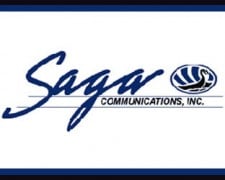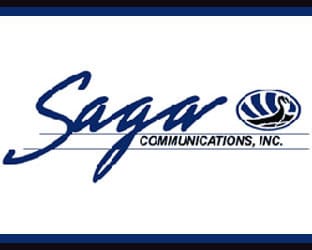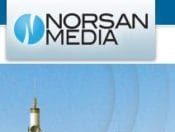 Saga reported Q1 free cash flow increased 23.8% to $4.0 million compared to the $3.2 million for the same period last year. Net operating revenue for the quarter increased 4.3% to $29.9 million from $28.7 million for the comparable period in 2011.
Saga reported Q1 free cash flow increased 23.8% to $4.0 million compared to the $3.2 million for the same period last year. Net operating revenue for the quarter increased 4.3% to $29.9 million from $28.7 million for the comparable period in 2011.
Operating income increased 24.4% to $5.0 million while station operating expense increased 1.0% to $23.0 million (station operating expense includes depreciation and amortization attributable to the stations). Net income for the period was $2.7 million ($0.64 per fully diluted share) compared to net income of $1.7 million ($0.39 per fully diluted share) for the same period last year.
Saga continues to maintain a solid balance sheet with $6.7 million in cash at the end of the quarter. As 3/31, the company’s outstanding bank debt was $60.0 million with leverage ratio calculated as a multiple of EBITDA of 1.8 times.
Capital expenditures in the Q1 were $1.2 million compared to $1.1 million for the same period last year. Saga currently expects to spend approximately $4-4.5 million for capital expenditures during 2012.
See the transcript of the call, below:
Ed Christian – President and CEO
Sam Bush – Senior Vice President, Treasurer and CFO
S. Bush The year started off positive with free cash flow growing 23.8% to $4.0 million in the First Quarter. Net revenue for the quarter increased 4.3% to $29.0 million. For the quarter, we had $511,000 in gross political revenue compared to $99,000 for the same period last year. This broke out with radio, which we include the networks at $404,000 this quarter of gross political revenue compared to $98,000 for the same period last year. TV’s was $107,000 during the quarter this year compared to $1000 last year.
National accounted for approximately 13% of gross revenue for the quarter compared to 14% for the same period last year. Our networks net revenue of $785,000 for the quarter compares to $755,000 for the same period last year. We had $176,000 of gross political revenue for the quarter this year, while we had none last year. Station operating expense increased one percent for the quarter this year, and we expect it to be up somewhere between 1.5 to 2% for the overall year.
In the other income or expense area, you will see that we saw a nice reduction in our interest expense for the quarter. This year, we paid $528,000 while last year, it was almost $1.2 million. This is primarily due to the continued reduction in the level of our outstanding debt, a meaningful reduction in the interest rate we are paying, and a reduction in the amortization in bank fees. We paid down $7.75 million in bank debt so far this year and still have $7 million in cash on hand.
Now that our total long-term debt, including current maturities to trailing 12-month consolidated EBITDA is below two times, we have no more required debt repayments. A $750,000 quarterly payment on our outstanding term debt will kick back in if our leverage ratio increases back above two times. Our outstanding bank debt is currently $60 million.
As reported in the press release, capital expenditures in the quarter were $1.2 million, which is approximately the same as last year. We are planning to spend between $4 and $4.5 million in capex in 2012. For 2011, we expect interest expense for the year to be between $2.3 and $2.6 million. Our anticipated total tax rate going forward will be 39 to 40%. We anticipate deferred taxes for 2012 to be between $3 million and $3.5 million. Current taxes will vary based on the income in each quarter.
Subsequent to the end of the quarter, we entered into an agreement to sell our Greenville, Mississippi TV station to H3 Communications. This sale will not have a material impact on our financial statements. The sale is subject to FCC approval and is expected to close during the Third Quarter.
Once again, this quarter we ask for your questions to be submitted via e-mail prior to the call. Ed and I will respond to those questions that we feel we can appropriately respond to later in the call. Ed, I’ll turn it back over to you.
E. Christian Thanks, Sam. One of the things I’ll just add right here is the Greenville TV station, WXVT-TV, as he mentioned; we are still happy with television. We look for other opportunities there. This was an asset that we look at where it could be placed in the best advantage for the TV station. But, in terms of our other markets, we’re extremely pleased to be there.
The interesting thing about the First Quarter is that our share of national went down from 14 to 13. That’s fine, because that again, as I’ve said many times, is really business that we don’t control. It either is or is not. If it does come in, it’s almost like a reverse auction where you raise your paddle, and every person that raises their paddle, the rates go down for the next person that raises their paddle until the rate is accepted.
We’re refocusing more on controlling our own destiny. It was nice that national was up. We think we’re going to have a very good national year because we’re in certain states that are becoming hot buttons right now, such as Ohio, Virginia, Iowa, Wisconsin, Missouri, Michigan, and New Hampshire. So, that bodes pretty well for us. Those are just the hot states and doesn’t mention the other action that’s going on in the states.
So, we think that this is going to be a good year and it was off to a good start in the First Quarter. I’m pleased about that. Again, I’m pleased that even with national being down as it was that our local was up. We did some things there, not … in the real sales or anything else like that, but really just a basic concentration in our core competency to do that.
Well, actually, we did have one thing. We had a kind of sales contest. But, when we do the sales contests, they’re more for a camaraderie building function within the sales departments. This time, we shared the information across our entire platforms so that other stations were able to see what all the other markets were doing on a weekly basis. It was a simple contest basically. It was new business that had not been on the air for a year that we concentrated on. It was very successful for us.
Again, it shows something that I’ve always said about our business. That is we sit here and we talk about doing a good job. But, I’ve always felt that if I took the entire sales staff of a station and put them on like one of those little airport busses and drove around and said who’s going on this account, who’s going on this account, who’s going on this account, we’d find out a lot of businesses that are still not being covered. That’s our responsibility to try and do that and look and see where we go to make more business.
We’ve said this a number of times, and I think it’s pretty true…said it could just be off or whatever. But, I think each year a station will lose 15 to 20% of its basic business through closures, media plan changes, whatever it might be, by going out of business, who knows what it might be, the sector is no longer deciding to do that. So, you always have to replace it. It’s the old thing from Glengarry Glen Ross, “ABC” – always be closing and always be selling. Not that I’m using that type of thing as a role model, but always a line that we try to emulate. Certainly we’re not selling land. We’re selling something else.
There was also an increase in retransmission consents in our…contracts kicked in, which is proving very good for us, so I think we follow any other companies. You’ll notice that there is a TV company that there are some lucrative areas appearing in retransmission money as a result of resetting the values up from their contracts from several years ago.
Boy, oh, boy. What else can I really bring everybody up to speed on? Well, you know in getting back to the idea of the direct selling and what we do. Saga’s a little different. We’ve always said that.
We don’t create stories and we really don’t seek industry press. We don’t do magic. By that I mean you can’t hide your tricks in radio or TV. We don’t have any black background or hidden mirrors that we can use to create an illusion of whatever might be. You’ve got to come right out in the open and do it.
So, our whole thing is if you’ve got to do it that way, do competent radio. I’ve said it time and time again. Radio really hasn’t changed in terms of the implementation of the real nugget of the business. There is no real secret sauce because we have to have all of our tricks available to everybody else. It’s just the basics over and over again. It’s finding the right salespeople, keeping them; the right management, keeping them; incenting people to do good creating an environment where people can grow; and they can feel good about coming in and doing their jobs.
I’ve always felt if you have somewhat of an entrepreneurial spirit, then just at the station levels where the management is empowered to really try to run and grow their business and do things and attract competent people, that those are the keys to success. It’s proven well for us and we don’t really envision changing our formula at all. We make no apologies. We are a radio and TV company with some networks.
We know what we are. We don’t hide behind anything else and it always is somewhat amusing to me when I see a number of companies trying to deny what they are and by changing their names to we are a new media company. We are an interactive company, that by the way we have radio stations that are going to that we use to promote our art interactively. Now, we’re radio and TV. We’re just kind of the traditional model.
I think that that’s our view of things in terms of looking at how our interactive folds into it. The answer is successful in interactive. We’re also evaluating it. I’ll be candid when I tell you that we’re looking at streaming and saying with the sound exchange rates that we…and in our small markets, we pay about close to $400,000 a year to Sound Exchange for the rights to stream. You add CSEC on top of that, you add the bandwidth that we have to buy and everything else and you look at what the profit percentage is on that, and what the streaming count really is and you have to evaluate it.
Jerry Lee has been very … with WBEB in Philadelphia for years without straining. So, we are looking at what is the bright line test and where do we do this. It also, when you get into streaming and a lot of people hype this, splits the seller’s concentration from…based core competency on the product of radio and TV. It’s not to say we’re banning interactive, because we do very well with our web sites and our platform and being on line. But, we’re just reevaluating the streaming component as to where it will stream and what place it will hold in our radio stations.
If we want to continue trying to monetize the stream, or just use the stream as an add on benefit for the regular advertisers that were on. We’ll have more on that probably in another couple of months. That’s just something we’re evaluating right now. We don’t stand there and say that we are not a broadcast company and I don’t click my heals with my ruby slippers and say three times that we are a new media company, we are a new media company, we are a new media company and then wake up and say suddenly I guess we are. We’re not and we don’t make any apologies for being what we do and do the best on it.
We plan to continue growing the company and we intend to look at a number of different things. We’ll get into that on Q&A.
With that, Sam, I think we’re going to brief today.
S. Bush We are.
E. Christian We have some questions there.
S. Bush This comes from R.C. and Daniel at Wachovia, Wells Fargo now, excuse me. “How is Q2 pacing?”
E. Christian Q2 is, and I think you’ll see this in every call that comes up. It’s kind of like the yellow flag is out there. It’s not the red flag; it’s not the green flag. But, drivers have reduced their speed. One month is up; the next month is down. It’s really kind of difficult to get a handle on.
That’s why I’m glad that we can have more control over our overall destiny in terms of creating business rather than waiting for business to come in. That’s something that works well for us. But, we’ll tell you it’s month by month and if anybody tells you that everything is going tickety-boom, they’re not reading the tea leaves correctly.
But, will we be fine? Yes. Will we get through it? Sure. Is it something that Q2 is right now making me feel giddy and euphoric? No. But, I know that we have the determination to get through it somehow. Is that guidance? I guess it is.
S. Bush Yes, kind of, in a nice way. “Can you characterize the M&A environment?”
E. Christian M&A’s getting really interesting. Now, that’s I think it. We have seen in the last several months a lot of companies which were inactive by their private equity owners or whatever, solidly slip themselves into the market place and putting their toes in the water to see what type of pricing they can get. We’ve seen that on a number of levels where I can just…they offered. But, we’re not exactly the highest of the food chain in terms of getting the offerings. Well, actually, we are because of our balance sheet and our financial capabilities.
But, I will tell you that I think that this is going to be a good year. Some of the people who are in the representation businesses, brokers, are also feeling this and are beginning to change where they’ve been sitting around and feeling kind of isolated for years, their…by this.
We’ve seen a lot of transactions in television, a lot of group transactions. We’re going to be seeing group transactions in radio and readjustment of portfolios. I think that it’s a good opportunity that we still have the disconnect between expectations and reality values because there has been a reset in that. But, in terms of where we are, I’m buoyed by some of the opportunities we’re seeing. We’re a very picky buyer. But, nevertheless, I think that we will find some truffles in this basket as we progress through the year.
S. Bush Thank you. You mentioned balance, our capital balance, the capital debt and so forth in talking about M&A, because we do have a good balance sheet. I’ve mentioned in my comments that we were at a bank debt of roughly $60 million right now.
E. Christian Can we find out from $130 when was our high?
S. Bush Yes, higher than $130, we were in the mid-$130s back in 2009 before we started the pay downs.
E. Christian Yes, thank you…thank you, Sam.
S. Bush It’s pretty good. But, the next question is “How do you think about your balance sheet specifically at this point with such low leverage?”
My comments, I mentioned that because we were below two times, we were no longer required to make any sort of debt reduction.
E. Christian Well, I’ve said this before and I think that every company has to have a certain amount of debt. It’s healthy. I think having zero debt is not really the particular way to go. I think where we are right now at 1.8 times EBITDA; we’re really in pretty good stead. I think that we’re down to where we should be and remain in terms of doing it.
Also, sitting in cash is not something that I really want to do. We are certainly not one of those companies that retains huge amounts of money. So, we have to look at what’s the best use of this and we’ve had discussions. In fact, we’re going to be having…discussion coming up at our board meeting pretty soon, either retain money for acquisitions because the company does have to grow.
Possibly look at dividends for the first time; it certainly is something that we’re doing. We’ve done stock buy backs in the past. It’s not out of the question, but it’s something we’re not leaning toward; again, retaining a certain amount of money to operate the company. Then the other is dependent upon the circumstances. I think we’ll probably let it grow for a little bit just to see in case there are some opportunities that break for us.
I used to say…, and Sam would correct me that I could buy a free station each year because we’ve got line an extra $10 million. Then, I go, oh, goody, I can spend $10 million and it won’t affect anything. I’m almost feeling that way again, but we haven’t seen the opportunities.
So, again, it’s a measure of response. The Board will look at it. I’ll look at it and we’ll find the best use of how we can apply our excess of cash.
S. Bush Very good. There’s one final question. “There’s a perception that local advertising is shifting to non-traditional mediums, specifically mobile. Are you seeing this take place with your local ad buyers?”
E. Christian You know, I just got a text on my phone the other day from like Wal-Mart. I’m going how did that happen? I’m not sure. We’re finding, we’ve just got a very successful texting contest and we’re building a huge data base both in e-mail and text. I think that we’re trying to find good ways to monetize that. I saw the figures on some contests we’ve run where we’ve captured e-mail addresses and some texting in numbers. They’re really pretty impressive and it allows us to look at possible using them ourselves.
I haven’t seen any business really say well, we’re going to use texting rather than radio. What I’ve seen are claims that Pandora is now trying to gather a big sales effort and create that. Then again, people say Pandora’s not going to run commercials on it.
I think that we’re seeing people looking at Facebook advertising and things like that. I wouldn’t say there’s been an erosion away from radio. I think that there has just been a re-evaluation and that again goes back to my comments earlier that there is a fiduciary responsibility if you have your company to continually look for new avenues and find new ways to recruit new businesses.
I can give you an example. I was listening to WINA, our AM station in Charlottesville, news talk station there. I heard them advertising for a camp, a summer camp for kids to the parents. Obviously, when you’re talking to a news talk audience, you’re talking to an older audience, parents and grandparents and using the radio advertising to try and recruit campers.
I thought okay. Here’s something that we as an industry probably go, well of course they’re out there. They’re working for people and they’re using radio for the first time to try and do this. That’s just one example of the types of things that are going to happen and types of things you can do.



![An O’ahu FM Is Spun To Mark Paskin Honolulu, from atop Diamondhead [Photo: Adam R Jacobson/RBR]](https://rbr.com/wp-content/uploads/IMG_5581-2-scaled-e1586964084556-218x150.jpg)

